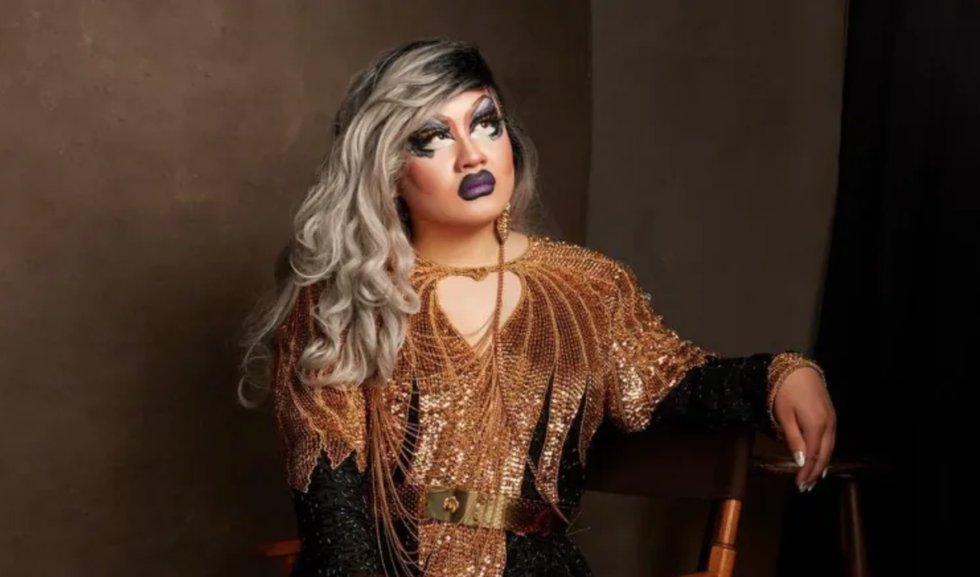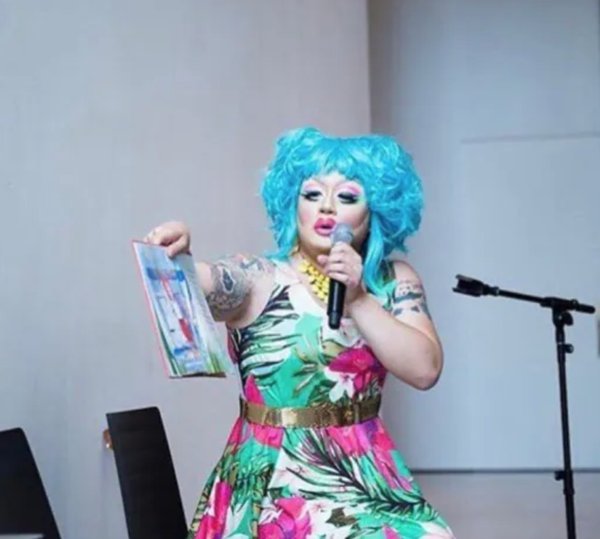After the Proud Boys targeted Drag Queen Story Hours throughout Pride Month, one San Francisco-based drag performer is finding hope in young people and the LGBTQ+ community.
BY ASHA SWANN
JULY 6, 2022

Drag queen Panda Dulce
Asian American drag queen Panda Dulce has been a part of a San Francisco Bay Area library’s Drag Queen Story Hour program since 2015, with the goal of bringing joy to children while reading books highlighting the importance of being yourself.
But Dulce did not expect that one of her story hours would be interrupted by men toting guns.
“It has empowered us to survive state-sanctioned violence, epidemics, and countless hate-fueled atrocities.”
During one of her June readings in celebration of Pride Month, a group that police believe are affiliated with the Proud Boys entered the library while carrying guns and shouting obscenities, accusing her of being a “groomer” and a “pedophile,” leaving children terrified.
Within weeks of this event, Proud Boys were reported at other drag queen storytime events in Michigan and Nevada, highlighting a pattern of anti-LGBTQ+ violence across the United States.
Though the Obama Administration achieved many major legislative victories for LGBTQ+ people, many of these were reversed under President Donald Trump through executive orders signed within the first 100 days of his presidency.
By 2017, several regulations blocking anti-LGBTQ+ discrimination had been rolled back, and by early 2018, seven states had “no promo homo” laws, where schools “explicitly prohibit the positive portrayal of homosexuality” in classrooms. Since then, more than 670 anti-LGBTQ+ bills have been filed in state and local governments throughout the country. Between January and March of this year, nearly 240 anti-LGBTQ+ bills were introduced in twenty-eight states.
Public libraries, while often a solace for young people and a much-needed community resource, are frequently the target of censorship and book bans. Because public libraries get their funding through municipalities and local districts, a library’s ability to function can be made precarious by supporting books on a banned list.
In Mississippi, a mayor withheld funding for a public library because it held certain novels contained LGBTQ+ content. According to the Office for Intellectual Freedom, a part of the American Library Association that raises awareness around issues of censorship, the books people most frequently request to be banned contain content that falls under one of three categories: “sexually explicit” language, “offensive language,” or content that is “unsuited to any age group.” Similarly, people opposing Drag Queen Story Hours often adopt this framing—one of the men in the group that stormed Dulce’s story hour was wearing a shirt with the phrase “kill your local pedophile.”
The misconception that queer and trans people are indoctrinating children has permeated throughout rightwing groups for decades. In 1977, less than a decade after the Stonewall Riots, anti-LGBTQ+ activist Anita Bryant said that parents need to protect their children from “the evil influence” of queerness. Two years later, Republican televangelist Jerry Falwell formed the Moral Majority, a politically active rightwing anti-LGBTQ+ group. As the HIV/AIDS epidemic began to spread throughout the LGBTQ+ community, media often described a “new homosexual disorder,” furthering the disbelief that queer people would indoctrinate their children into sexually explicit, disease-filled lives.

Dulce reading to children during a Drag Queen Story Hour.
The attack on Dulce mirrors decades of intolerance toward the LGBTQ+ community: discrimination that has been allowed to exist on a national scale under the illusion that queer communities seek to harm children. The backlash toward Drag Queen Story Hour programs directly correlates to the way queer people have been censored throughout U.S. history. From banning LGBTQ+ content to using weapons to silence a queer person attempting to read to children, anti-LGBTQ+ hate has widely become normalized.
But Dulce tells The Progressive that, because “there is a historical precedent for this,” queer people are not allowing themselves to become further victimized by anti-LGBTQ+ cruelty.
“It has empowered us to survive state-sanctioned violence, epidemics, and countless hate-fueled atrocities,” she continues. She explains that people need to face the reality that homophobic violence is never isolated and should not come as a surprise.
“I need LGBTQ+ allies and parents to understand that it is no longer socially acceptable to feign shock that such an event occurred in 2022, in California, in the Bay Area. It doesn’t matter how liberal your city or metropolitan area is,” she says. “The sooner you accept this disquieting truth, the sooner you can meet us in reality.”
Dulce is a strong believer in the power of community and of chosen family, who, she says, can remind queer people that they are loved, supported, and protected when anti-LGBTQ+ violence occurs. Dulce is also impressed by the youth-led movements like March For Our Lives.
“Do not for a second think that you are too young, too inexperienced, too ill-resourced to change our world,” Dulce says. “Do not for a second think that you need permission from anyone.”
Dulce also offers a piece of hope, despite the trauma from just a few weeks ago. Even though what happened at her library comes from an ongoing pattern of bigotry, she explains that she finds power in speaking up and urges queer children to find a community that supports them.
“For every villain out there still reeling from their own childhood trauma, there are countless others who unwaveringly believe in your safety, your humanity, and your right to thrive,” she says. “Our power is in our voices. Keep thinking, keep speaking, and keep showing up. We will beat them.”

Asha Swann is a freelance journalist and university student based in Toronto, Canada. Read more of her work at ashaswann.com
No comments:
Post a Comment